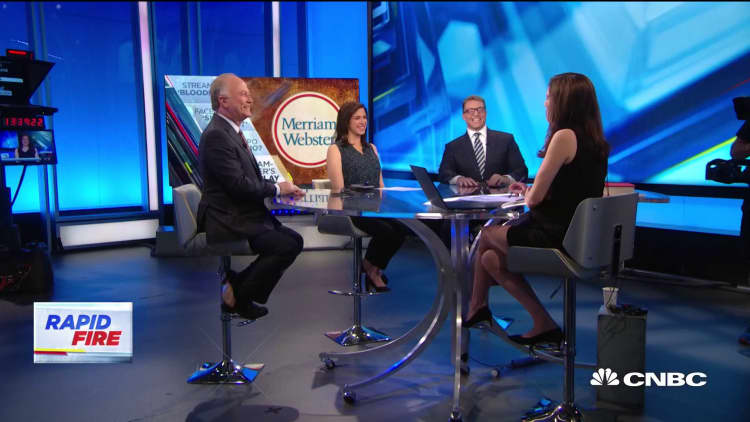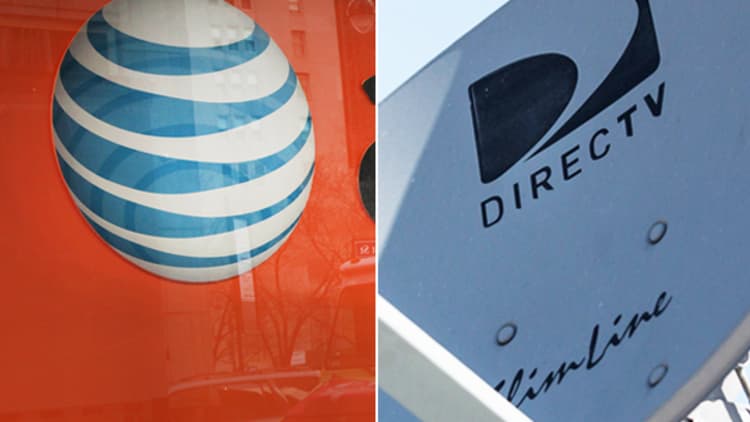Hedge fund Elliott Management is already turning the screws on AT&T, just 10 days after disclosing a $3.2 billion stake and calling for recommendations for improving leadership and operations.
But AT&T is not yet feeling the pain.
AT&T is not focused on divesting or selling DirecTV, sources tell CNBC. Both options are being pushed by Elliott, which believes a Dish-DirecTV merger can get done in today's regulatory environment even though such a deal was struck down in 2002, according to people familiar with the matter.
There are no talks between AT&T and Dish about a merger, as both sides see the deal as a tough sell to be approved by regulators, though Dish could be persuaded to come to the table if co-founder and Chairman Charlie Ergen felt the risk-reward benefit was high enough, according to people familiar with the matter.
Spokespeople at Dish and DirecTV declined to comment.
Elliott could push harder on replacing AT&T CEO Randall Stephenson if AT&T resists splitting off DirecTV, according to people familiar with the matter.
In fact, Elliott has privately called on AT&T to conduct a wide search for a new CEO when Stephenson retires, which the hedge fund expects will be next year, said the people, who asked not to be named because the discussions are private. Elliott could also nominate a slate of new AT&T board members in January for AT&T's annual shareholder meeting, which typically takes place in April.

Stephenson's preferred heir apparent seems to be current WarnerMedia CEO John Stankey. Stephenson said this week that Stankey was "in a pretty good position" to take over as CEO if he executes well in his current role running WarnerMedia. But Stankey was instrumental in buying DirecTV and told CNBC in June he planned to merge the user interface of the digital streaming product DirecTV Now with HBO Max over time. By conducting a wider CEO search now, Elliott could gain control over the succession process before Stankey has a chance to take over.
AT&T spent $67 billion on DirecTV in 2015. The thinking at the time was AT&T could bundle DirecTV's satellite TV service with its wireless service and, in some areas of the U.S., its U-Verse high-speed home internet service. For consumers who didn't want traditional satellite TV, AT&T could offer DirecTV Now, a bundle of linear networks delivered over the internet, as a replacement product that would be nationally available and would run on wireless networks.
AT&T expected DirecTV's satellite TV business to decline, though the speed at which it has lost customers has surprised some internally. The satellite TV business has hemorrhaged millions of subscribers in recent years as customers move to internet streaming options. Unfortunately for AT&T, DirecTV Now — rebranded to AT&T Now last month — hasn't acted as a replacement product for satellite. Instead, AT&T has seen a slew of DirecTV Now defections after it ended promotional pricing and announced a $10-per-month price increase in March. DirecTV Now lost 267,000 net subscribers in the fourth quarter of 2018 and another 251,000 customers through the first half of 2019.
Still, even with the losses, AT&T has more than 20 million pay-TV customers. That's a huge distribution network to market its new streaming service, HBO Max, which Stephenson and Stankey hope will improve AT&T's share price by adding new growth to the wireless giant. Stankey is aiming to get 70 million to 80 million paying subscribers for HBO Max, which will combine HBO with new originals, shows such as "The Big Bang Theory" and "Friends," and programming from cable networks TNT, TBS and CNN.
Dish merger concerns
One big problem with selling DirecTV is finding a buyer.
Elliott believes Dish could be a candidate, sources said. It's a lot easier to combine two troubled companies, such as when Sirius and XM Satellite Radio merged in 2007. The last time Dish and DirecTV tried to merge, and got shot down by regulators, both were growth companies. That's no longer the case.
Still, a deal would pose some regulatory risk, and Dish is already waiting on regulatory uncertainty as 18 state attorneys general are suing to block T-Mobile's merger with Sprint. Dish is a beneficiary of that merger, as it will acquire divested assets and strike a network sharing agreement with T-Mobile upon its approval.
Dish and DirecTV have contemplated a variety of merger structures over the years, including within the last year, according to people familiar with the matter. Telecommunications bankers have pitched both Ergen and DirecTV on a joint venture of the satellite assets owned by both companies, said the people.
Another problem with Dish acquiring DirecTV is the relative size of the companies: DirecTV is bigger. Specifically, Dish has a market capitalization of about $18 billion and an enterprise value of about $30 billion. AT&T acquired DirecTV for $67 billion with debt, and while the company has lost value, some close to the matter still believe the asset could be valued near $40 billion.
Several AT&T executives are also reluctant to negotiate a deal with Ergen, said people close to the situation. Ergen is a notoriously difficult dealmaker. Elliott Management hopes to force AT&T to the table to deal with Ergen, given the obvious synergies a deal would present, said two of the people.
Divesting DirecTV may help AT&T's shares by removing a negative-growth overhang, but a publicly traded DirecTV is likely to have limited appeal to shareholders with its obvious lack of growth prospects. AT&T shareholders may balk at the idea of taking DirecTV shares if there's an expectation that the public market valuation of the company will plummet.
Private equity
Ultimately, both Dish's satellite TV business and DirecTV's business may be best off in the hands of private equity. The structure of traditional pay TV is an ideal fit for private equity, which can leverage the businesses based on its predictable recurring monthly cash flows. Declining growth also wouldn't be an issue to leverage buyout firms.
But while private equity may be the best ideal buyer, putting together partners to buy a majority stake in a business that could be valued between $30 billion and $40 billion would be difficult. So-called "club" deals, where private equity funds buy minority stakes to form an overall majority, are far less common than they were a decade ago.



